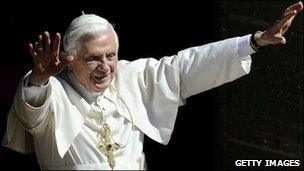Taxpayers should not fund Pope's visit, says survey
- Published

Pope Benedict's four-day tour will include an open-air service in Glasgow
Some 77% of Britons think taxpayers should not help pay for Pope Benedict XVI's visit to Scotland and England, a survey suggests.
An online poll of 2,005 adults issued by think tank Theos also found 79% had "no personal interest" in his visit.
The Pope is due to arrive on 16 September, the first papal visit since Pope John Paul II's 1982 trip.
The cost of the trip to UK taxpayers, previously estimated at ВЈ8m, could rise to between ВЈ10m and ВЈ12m.
The Catholic Church is also expected to make a contribution of between ВЈ9m and ВЈ10m towards the costs, which do not include an expected multi-million pound bill for policing the visit.
In the Theos survey, some 76% also rejected taxpayer funding for the visit on the grounds that the Pope was a religious figure.
Nearly one in four - 24% - agreed with the statement "I don't approve of the Pope's visit to Britain" with 49% disagreeing.
Under a third, or 29%, said they believed the visit would be good for Britain while 33% disagreed.
Earlier this week, a survey of 1,000 Scots found just 2% were "strongly opposed" to the visit, with more than 15 times as many people saying they were in favour of it.
Another 3% in the survey carried out by Opinion Research Business for the Roman Catholic Church, said they "objected" to the pontiff's visit to Scotland. Some 63% said they were "neither for nor against the visit".
Social teaching
In the Theos survey, researchers also put 12 statements - taken without naming the source - from the Pope's third encyclical letter which outlines his social policy, to people taking part in the survey.
A majority backed 11 out of the 12 extracts, including 82% agreeing with the statement "technologically advanced societies can and must lower their domestic energy consumption".
Some 79% agreed with the Pope's statement "the natural environment is more than raw material to be manipulated at our pleasure".
Paul Wolley, director of Theos - a religious think tank - said the British public "clearly had a problem" with the funding of the papal visit, possibly because they were unaware that in addition to being a religious leader Pope Benedict was also a head of state.
"It is only a relatively small proportion of people who are actively opposed to the visit itself. On the whole, the public is more disengaged than hostile.
"What is really striking is not simply that the public tends to agree with Pope Benedict's social teaching but that they agree so strongly.
"This confirms the view that beneath the terrible stories of sex abuse that have dominated coverage of the Catholic church in recent times, there remains real potential for the church to connect with the public."
Added value
The non-religious British Humanist Association welcomed the Theos poll, saying that "most people agree with us" that the British public should not be "footing the bill" for a state visit by the Pope.
A spokesman for the Catholic Bishops' Conference however said it was pleased the survey showed the majority of people agreed with Catholic social teaching.
"It is also good to see that so many people in the UK approve of this historic visit. The Pope will bring a message of hope to all, showing that faith in God is not a problem to be solved but a gift to be discovered afresh by all.
"While there is considerable discussion and debate in the lead up to the Pope's visit, once he arrives and people see him and hear what he has to say they will give him a warm welcome."
Jack Valero, a member of Catholic Voices, an organisation representing Roman Catholics, told ҙуПуҙ«ГҪ's Radio 5 Live that the economic activity generated by the Pope's visit would eclipse the expense of the visit.
He said a study for Glasgow City's marketing bureau had worked out that Glasgow and Edinburgh would accrue about ВЈ13m because of extra people visiting as well as the "media (and) advertising value" to the two cities.
A Government spokesman said: "The Holy See is an internationally-recognised nation with significant influence across the world, while the Catholic Church has a billion adherents.
"The Pope is visiting at the invitation of the Queen. It is right and proper that the British Government should pay a share of the costs of the visit."
- Published5 July 2010
- Published23 August 2010